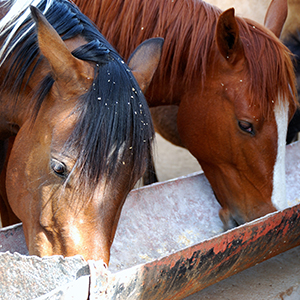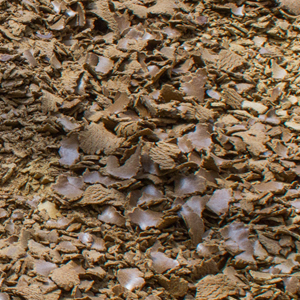Linseed cakes in horse feeding
Linseed cakes and linseed flakes in horse feeding
Linseed cake or linseed flakes are the vegetable constituents of the pressed linseed from the production of linseed oil, which remain after the pressing. These plant press residues are by no means waste – quite the contrary, they are a very valuable and 100% natural feed for horses and other animals. After the pressing, linseed cake contains only a low oil content of approximately 12% to 14% which means it is easily digestible for the horses. Because of the cold pressing, linseed flakes show a higher digestibility and a higher yield than whole linseed.
In the feeding of horses and ponies, linseed cake are a healthy supplementary feed. High-quality and pure linseeds are used, from which the linseed oil and the linseed cake are obtained as a by-product in a very gentle cold pressing process. Cold pressing has the advantage that the health-promoting and temperature-sensitive ingredients are preserved. Linseed cakes for horses are natural. They do not contain any preservatives, flavors, or additives. Linseed cakes are easy to handle, they can be fed dry and do not need to be milled, cooked or soaked.
The benefit for the health of your horse
Linseed cakes contain valuable ingredients, just like the entire linseed. Particularly advantageous are the high proportion of the polyunsaturated omega-3 fatty acid "alpha-linolenic acid", the high-quality vegetable protein and the valuable mucilage in the seed shell. In addition, linseed flakes contain lecithin, vitamin B1, vitamin B2, vitamin B6, vitamin E, folic acid (vitamin B9), pantothenic acid (vitamin B5), antioxidants, minerals and amino acids, such as lysine. Therefore, the linseed flakes promote the health of the horse in several ways.
The linseed shell contains water-soluble and water-insoluble mucilage, which have a very positive influence on the gastrointestinal tract and support the digestion. The water-soluble mucilage possesses a softening and abirritant effect on the mucous membranes and form a protective layer. Irritated mucous membranes in the stomach and intestines are soothed. The gliding ability of the stomach and intestinal mucous membranes is improved. Too hard excrement masses are softened – which is particularly important for colic horses. Even after a colic, these mucilage supports the regeneration of stomach and intestines. The water-insoluble mucilage acts in the gastrointestinal tract, swells up when water is absorbed and increases the intestinal volume. Thus, it has a stool-regulating effect and prevents constipation. The natural mucilage of linseed regulates the intestinal flora, promotes the growth of good microorganisms in the intestine, supports the absorption of the nutrients and counteracts digestive disorders.
The contained unsaturated fatty acids have an inflammation-inhibiting effect and boost the immune system. They also provide a healthy skin, a shiny fur and a smooth fur change, just like the vitamins and minerals.
Linseed flakes have a high-protein content (35%) and contain many amino acids, such as lysine (12 g per kg). With their high fat and protein content, linseed cakes are especially beneficial and recommended for feeding sport horses, older, sick horses (with the exception of horses with liver and kidney disease) and horses that are difficult to feed, as well as in foal rearing.
Linseed flakes promote the following:
- health of the gastrointestinal tract, digestion, bowel movements and metabolism
- the prevention of diseases
- the regeneration and recovery
- the healthy texture of skin and fur
- the general well-being of the horse
- the performance
The problem with prussic acid from linseed
A widely discussed subject is the prussic acid in linseed. Linseed contain the substance linamarine, which is a cyanogenic glycoside. Enzymes and processes in the intestinal flora decompose it to prussic acid. As a result of the conversion, about 0.2 grams of prussic acid are produced from 1 gram of linseed. It can be rendered harmless by heating the linseed. However, the cooking of the linseed also destroys the useful substances, such as the mucilage discussed earlier on. As a result, linseed and linseed flakes lose their health effects and are no longer an advantage.
In fact, poisoning by prussic acid is rare in horses even with a daily or higher dose. A large horse weighing 500 kg would have to eat two to five kilograms of linseed per day for fatal poisoning, which is quite unrealistic in the practice of feeding. A quantity of 100 g to 120 g of cold pressed linseed flakes per animal and per day can be fed to adult horses without any problem according to experts.
Dosage during feeding
For the feeding of normal and healthy horses, an average daily quantity of 20 g of linseed flakes per 100 kg of body weight is recommended. For a horse with 500 kg body weight, this is a total of 100 g of linseed flakes per day. For ponies and small horses, 30 g to 60 g of linseed flakes are recommended.
The veterinarians and experts for horse feeding Prof. Dr. Helmut Meyer and Prof. Dr. Manfred Coenen recommend a dosage of up to 200 g of flakes per day in the feeding of older and emaciated horses. (Source: Meyer / Coenen, "Pferdefütterung", 5th edition)
The advantages of linseed flakes in horse feeding
Naturally pure and high-quality linseed cake or linseed flakes enrich the daily nutrition of your horse as additional food. Linseed have the highest concentration of healthy omega-3 fatty acids among all plants and contain valuable mucilage for the stomach, intestines and digestive system. With a relatively small amount of linseed cake per day you can positively influence the health and performance of your horse.
Photo Credits: © Algul - iStock.com



